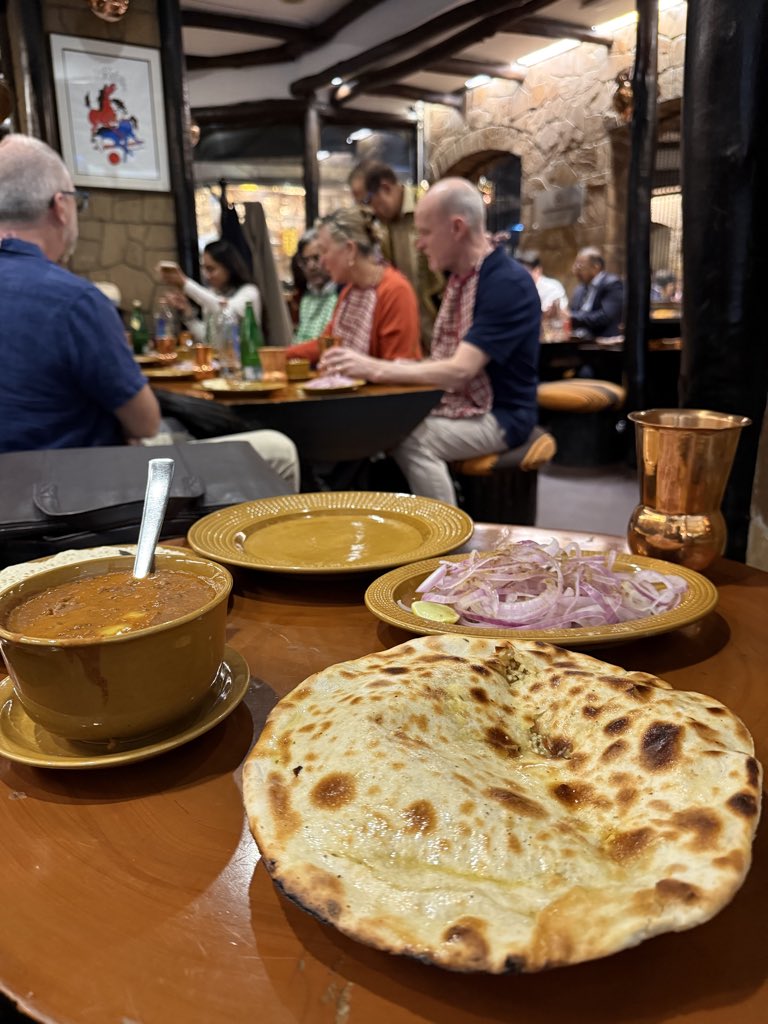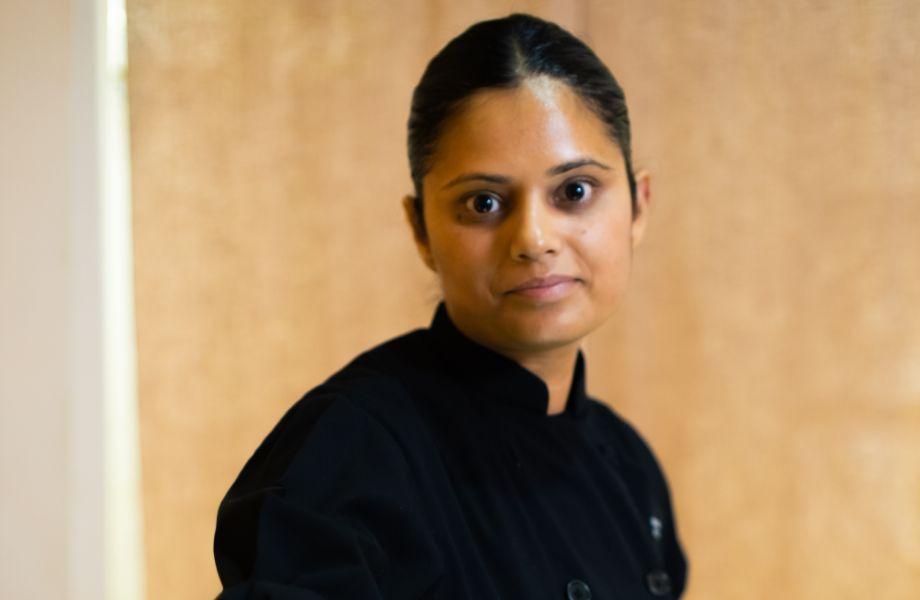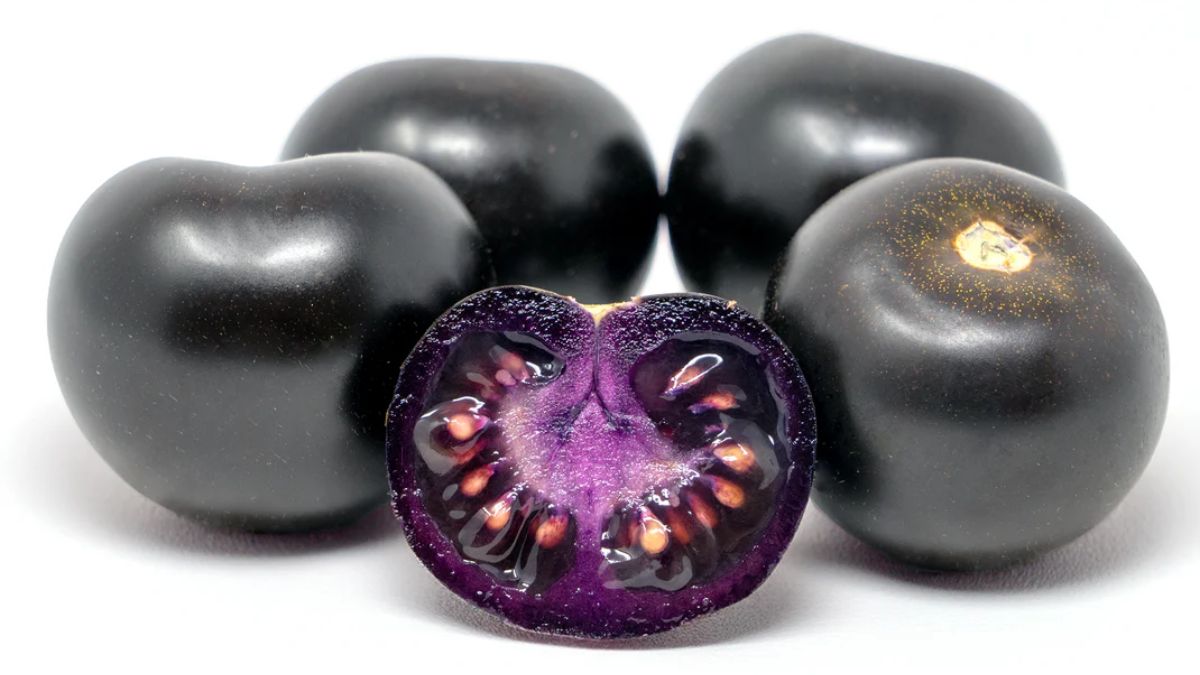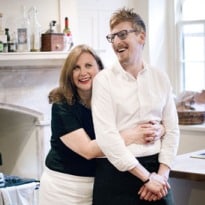Angela Hartnett and Neil Borthwick first met in the kitchens at the Connaught hotel in London in 2002 where she was head chef and he was there as a willing junior. He was only meant to be there for a couple of weeks. In the end, he stayed for the best part of four years.
"She fancied me," Borthwick says by way of explanation.
Hartnett rolls her eyes. "I'm saying nothing," she replies. "I was professional to the end."
Hartnett, 44, went on to open the Michelin-starred Murano in Mayfair and start a mini-empire in the mould of her one-time mentor, Gordon Ramsay. More recently, she launched the restaurant at the Lime Wood hotel in Hampshire, and is planning a new restaurant on the site of the old Petrus in St James Street, but on 1 October will open the Merchant's Tavern in a former Victorian warehouse in Shoreditch. The head chef? None other than her 32-year-old boyfriend.
"Essentially, it's Neil's restaurant," Hartnett explains when we meet in Murano. The interior is exquisitely decorated in shades of muted grey and green. Today, they are seated on the sort of padded leather banquette one imagines was made from the skin of ostriches bathed in champagne. Both are wearing chef's whites - but only Hartnett's are embroidered with her name in blue cursive.
"It's the same as what Gordon did with me and Jason [Atherton] and Marcus [Wareing]," she continues. "They will write the menus and I will influence them because my name's attached to it ... but it's Neil's name above the door."
Borthwick has his own impressive pedigree. He was born and raised in Falkirk and started working in the bar of a local hotel at the age of 14. He went to catering college in Glasgow, got his first job in Gordon Ramsay's Amaryllis and, after his stint at the Connaught, took off to France for three years to work for Michel Bras in Laguiole where he was taught the precise, inventive cuisine that has made Restaurant Bras into one of the top gastronomic destinations in the world.
Borthwick worked his way up to sous chef. He says he loved the work-life balance in France and became fluent in the language: Hartnett used to visit him as a friend for long weekends to sample the local restaurants, taking advantage of his French to order the best things off the menu.
Bras wanted him to move to Japan to be head chef at his restaurant there but Borthwick felt "it would just be doing his food again and I thought it would be a long way away." By this stage, he and Hartnett were a couple. He returned to the UK and got a job at the Square, under Philip Howard, just down the road from Murano. Soon, the two of them were living together in Hartnett's house in Spitalfields.
Despite the hours and brutal pace of life as a top chef, they make an affectionate couple who seem to like nothing more than teasing each other. When I ask Borthwick to say something romantic, he looks mildly taken aback.
"Angela makes a lovely bowl of pasta," he says. "Is that romantic?"
Their interests are complementary - she's an Arsenal fan, he supports Spurs - and they have the same taste in food.
The modern European menu at the Merchant's Tavern will reflect this unfussy approach. "As much as I've worked in three-Michelin starred places where things have to be exact, I'm not going to shout about something if it doesn't look perfect," says Borthwick, "because it doesn't taste any better."
But what if he does something wrong? Isn't it going to be hard for Hartnett to tell off her boyfriend?
"The chances of that are minimal," jokes Borthwick. "Very minimal, obviously," Hartnett says drily. "You have to have ways of doing things ... [but] I'd pull Neil aside and say, 'By the way, this isn't quite right.'"
She cracks her fingers menacingly. Borthwick doesn't seem remotely perturbed. "It's like Alan Sugar on The Apprentice," he says. "The entrepreneurs would be mad not to take the constructive advice."
They both laugh.
The most extraordinary thing about their story is that it almost had a very different ending. One night last November, Hartnett was woken by two policemen knocking on her door at 1.30am. They told her Borthwick had been in a cycling accident and was now at the Royal London Hospital in Whitechapel. The police had his phone and her number was the last one called.
The police were able to tell Hartnett that her boyfriend was alive but, other than that, they had no further details. In the grip of shock, she remembers making small talk about the policemen's shoes, "because you do, don't you?"
When Hartnett got to the hospital, she found Borthwick in an induced coma and a team of neurosurgeons trying to ascertain what damage had been done to his brain. "They couldn't answer any questions," she says now. Those first few days of uncertainty were, she admits, "horrible".
"The first feeling is shock," she says. "I've never experienced anything like this. My father died when I was young [Hartnett was eight], my grandmother died but I've never had someone physically ill like that in front of you."
"My brother said: 'You're very calm,' and I said: 'This is the easy bit. The hard bit will be when he comes out and can't move his legs or taste anything.'"
Borthwick can't remember the specifics of what happened. He recalls the day leading up to it - he had been out for a lunch with friends, then went home to pick up his bike to meet another mate in the evening. He was only going a short distance and for some reason he didn't wear his helmet or his cycling kit. It was on City Road, a few minutes from their house, that the accident happened. Witnesses said they saw the bike "wobble". Borthwick thinks his feet might have slipped on the pedals. He fell awkwardly.
Borthwick suffered what the doctors described as "a severe knock to the head" which doesn't quite seem to do justice to the seriousness of the injury. Hartnett talks about it like an internal bruise: "When you bruise yourself, the bruise expands. But if it's in your head, the bruise has nowhere to go."
At one point, a female surgeon described Borthwick's brain to her as "like a crème brûlée". It was only later that her colleagues pointed out she'd been talking to a Michelin-starred chef.
"People slag off the NHS but you can't imagine how faultless they were," Hartnett says. "If a restaurant could run like a high impact unit it would be staggering. Neil had 24-hour care."
Borthwick was kept in a coma for five days, "basically," he explains, "on the same drugs that Michael Jackson had paid his doctor to give him."
He had weird dreams, involving a bet he'd failed to place on the outcome of the Ryder Cup, but even when he was unconscious, he retained his fine-dining palate. Borthwick kept trying to remove his intravenous drip so the nurses ended up covering his hands in what looked like a giant pair of oven gloves.
During that time, Hartnett set up a blog to keep friends and family updated on his progress. It was easier, she says, than answering the hundreds of texts individually and it meant that Borthwick's friends could post things, too - among them Michel Bras.
When Borthwick finally came round, doctors were astonished at his rapid recovery. From the neck down, he had sustained no other injuries. He immediately recognised people. Within 15 days, he was speaking fluent French and craving grilled cauliflower and turbot. The hospital food was supplemented by deliveries from London's finest restaurants: a chef friend sent him a plate of roast goose; his boss Phil Howard came with a plate of broccoli and vegetables.
"Neil was lucky," says Hartnett. "He was young and fit and had no other injuries, which was incredible."
Also, because he landed on the left side of his head, he found he could still perform tasks with his right hand without too much bother. He was home by Christmas.
But it wasn't all plain sailing. Borthwick had an operation to drill a hole in his skull in order to release the pressure. Six weeks ago, he had a second procedure: major cranioplastic surgery to put a plate in his skull. The plate was constructed of methacrylic resin moulded to the shape of his head and was fitted with titanium screws.
"It was made in Italy," Borthwick says with pride. "It's actually quite a nice shape. I'm going to make the spare one into a bowl for Twiglets in Charlotte Road." He's joking. I think.
In the aftermath of the accident, he was relieved to find that his palate wasn't affected but the motor skills in his left hand were still weak. For a while, Borthwick was worried he wouldn't be able to cook with his customary precision and delicacy. When he returned to work at the Square in the new year, he was "nervous" and found himself "in tears in Phil Howard's office about it... He's been a great friend."
In retrospect, Borthwick admits that he went back to work too early because he so desperately wanted things to be normal again. He started to suffer seizures and was forced to rest. "You slowly have to build up your stamina," he says. "That will come in time."
To look at Borthwick, you would struggle to know what he has been through. But he still hasn't been able to face getting back on his bicycle. Understandably, then, the prospect of opening a restaurant in under a month is enough to make him feel anxious.
And yet, when he makes me lunch, it's clear that he has lost none of his touch. The plates of food that come to the table are unfussy and delicious - tangy artichokes with a zesty pesto; glistening cod; the best lamb I've ever tasted and a honey tart with roasted apricots that takes me straight back to childhood (in a good way). When I tell him how much I enjoyed the food, Borthwick seems genuinely pleased. "My confidence is coming back but it's not quite where it was," he admits.
The Merchant's Tavern deserves to be a raging success, not just for its food but for the extraordinary achievement it represents in terms of Borthwick's recovery. He's come a long way - and he's got the Twiglets served in a skull-shaped bowl to prove it.
In Picture: Angela Hartnett, Neil Borthwick and their dog Alfie photographed at home in Spitalfields, London. Photograph: Pål Hansen for Observer Food Monthly.











